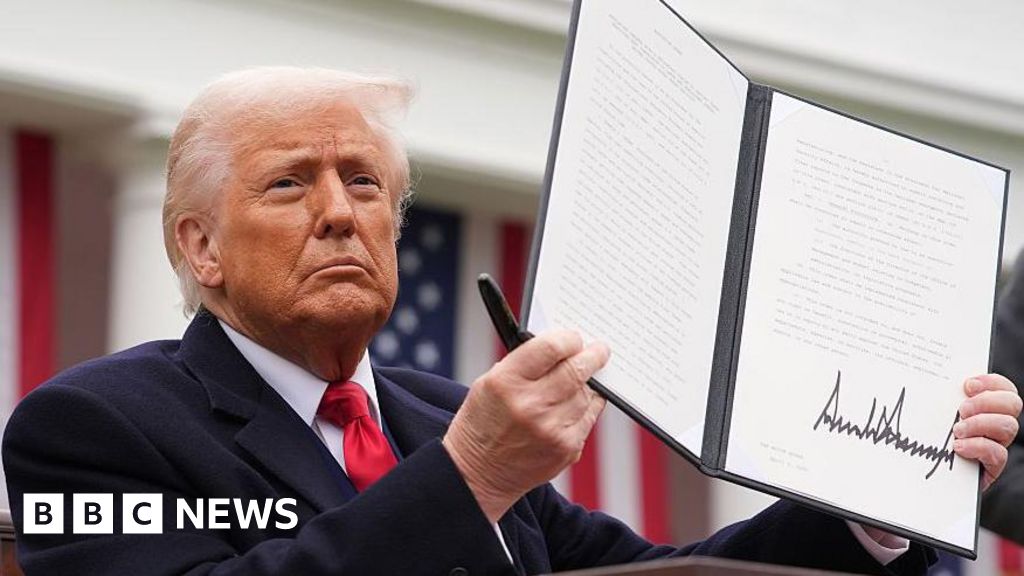【新闻摘要】
特朗普的"关税大棒"终于砸出个响来!日本这个全球最大美债持有国(1.1万亿美元)居然乖乖签了城下之盟,同意美国对日货征收15%关税——比英国的10%还狠,但谁让日本对美贸易顺差大呢。最搞笑的是,谈判期间以礼貌著称的日本代表竟在华盛顿外交圈留下"暴怒"传说,财务大臣甚至威胁要抛售美债当"谈判筹码"。不过特朗普可能偷着乐呢:今年美国关税收入已破千亿,财政部长还梦想着年入3000亿。只是苦了美国老百姓——美元今年跌了10%,进口商品价格眼看要起飞。英格兰银行行长都看不下去了,说现在市场最拥挤的交易就是"做空美元"。这场贸易战最魔幻的是:本想打压中国,结果反倒帮中国证明了自己才是"更稳定的贸易伙伴"。看来特朗普的"交易艺术"就是:让盟友流血,让对手偷笑,让自家消费者买单!
---
**Trump's tariff tactics yield results as Japan strikes deal**
特朗普关税策略见效 日本达成协议
**13 hours ago Share Save Faisal Islam Economics editor, BBC News Share Save**
13小时前 分享 保存 BBC经济主编费萨尔·伊斯兰 分享 保存
**Getty Images**
Getty Images
Japan's agreement to US tariff demands marks a significant victory for President Donald Trump's overhaul of global trade. In purely tactical terms, his aggressive approach appears to be delivering concrete outcomes. While US officials had been touting the prospects of a Japan deal for months, substantive progress remained frustratingly out of reach - until this breakthrough. This constitutes a validation of the Trump playbook, particularly if Japan's acquiescence triggers a domino effect among other nations. Among America's major trade surplus partners, Japan has now secured the most favorable terms - or more accurately, the least punitive arrangement. The blanket 15% tariff on Japanese imports to the US exceeds the 10% rate imposed on British goods, though the UK maintains no trade surplus with America. As previously reported, Japanese negotiators' uncharacteristic displays of anger during talks became a talking point among Washington diplomats more accustomed to their legendary politeness.
日本同意美国关税要求标志着特朗普总统全球贸易改革取得重大胜利。纯粹从战术角度看,他的强硬策略似乎正在产生具体成果。尽管美国官员数月来一直在吹嘘与日本达成协议的前景,但实质性进展始终难以捉摸——直到这次突破。这验证了特朗普的策略,特别是如果日本的默许在其他国家引发多米诺骨牌效应。在美国主要贸易顺差伙伴中,日本现在获得了最有利的条件——或者更准确地说,惩罚性最轻的安排。日本进口商品全面征收15%关税,高于英国商品的10%税率,尽管英国对美国没有贸易顺差。正如之前报道的那样,日本谈判代表在谈判中一反常态的愤怒表现,成为更习惯他们传奇礼貌的华盛顿外交官们的谈资。
Tokyo played its cards strategically. The finance minister pointedly referenced Japan's $1.1 trillion holdings of US Treasury bonds - the world's largest - as a potential bargaining chip. Market turbulence ensued after April's"Liberation Day" tariff announcement, when rumors swirled about Japanese hedge funds dumping US debt, raising fundamental questions about the dollar's safe-haven status. Consequently, this agreement carries immense symbolic and practical weight, both as a standalone achievement and as a template for other economic powers like the EU. The timing is particularly telling, coinciding with Japanese-EU leadership talks in Tokyo that might have explored coordinated retaliation. This deal effectively short-circuits such efforts. Certain EU members may now question why they can't secure similar terms, especially as Franco-German leaders escalate retaliatory measures targeting US tech giants. While full details remain pending, Japan appears to have safeguarded key agricultural imports while conceding to increased American rice purchases. The agreement also envisions Japanese private sector investments worth $500 billion in the US, though it's unclear how this will overcome local aversion to bulky American cars.
东京打出了战略牌。财务大臣刻意提到日本持有的1.1万亿美元美国国债(全球最大)作为潜在谈判筹码。4月"解放日"关税公告后市场出现动荡,当时有传言称日本对冲基金抛售美国债务,引发对美元避险地位的根本性质疑。因此,这项协议具有巨大的象征和实际意义,既是独立成就,也是欧盟等其他经济大国的模板。时机尤其能说明问题,恰逢日本与欧盟领导人在东京举行可能探讨协同报复的会谈。这项协议有效地阻断了此类努力。某些欧盟成员国现在可能会质疑为什么他们不能获得类似条款,尤其是在法德领导人升级针对美国科技巨头的报复措施之际。虽然完整细节尚未公布,但日本似乎保住了关键农产品进口,同时让步增加对美国大米的采购。协议还设想日本私营部门在美国投资5000亿美元,尽管尚不清楚这将如何克服当地对美国大排量汽车的厌恶。
Japan's decision to settle now, rather than wait to observe the impact of Trump's August 1 tariff escalation against multiple nations, may reflect Prime Minister Shinzo Abe's domestic political vulnerabilities - though other Southeast Asian nations like Indonesia and the Philippines have also folded. The broader narrative reveals a grim resignation among US allies to accept tariffs that would have been inconceivable a year ago, simply to avoid worse alternatives. For Japan, the precipitating threat was Trump's proposed 25% auto tariffs.
日本决定现在解决,而不是等待观察特朗普8月1日对多国加征关税的影响,可能反映了安倍晋三首相的国内政治弱点——尽管印尼和菲律宾等其他东南亚国家也已屈服。更广泛的叙述揭示了美国盟友之间的一种严峻的默认态度,接受一年前还不可想象的关税,只是为了避免更糟糕的选择。对日本来说,直接的威胁是特朗普提出的25%汽车关税。
**US Treasury coffers swell with tariff windfall**
美国财政部因关税意外收入而资金充裕
The Trump administration is harvesting unprecedented tariff revenues without facing proportional countermeasures against US exporters. Fiscal year-to-date collections exceed $100 billion, constituting 5% of federal receipts compared to the historical 2% norm. Treasury Secretary Scott Bessent projects annual tariff proceeds could reach $300 billion - still dwarfed by income tax but nevertheless substantial. This revenue stream continues despite the absence of both retaliatory actions and the market volatility witnessed earlier. However, critical questions persist about ultimate payers. American consumers will bear much of the burden through higher import prices. Bessent previously suggested dollar appreciation could cushion this blow, but the opposite occurred - the greenback has depreciated 10% against major currencies this year, compounding import cost pressures beyond tariff impacts alone.
特朗普政府正在收获前所未有的关税收入,而没有面临对美国出口商的相应反制措施。本财年迄今的关税收入超过1000亿美元,占联邦收入的5%,而历史常态为2%。财政部长斯科特·贝森特预测年度关税收入可能达到3000亿美元——虽然与所得税相比仍然相形见绌,但数额可观。尽管没有报复性行动和之前出现的市场波动,但这一收入流仍在继续。然而,关于最终支付者的关键问题仍然存在。美国消费者将通过更高的进口价格承担大部分负担。贝森特此前曾表示美元升值可以缓解这一打击,但情况恰恰相反——今年美元对主要货币贬值10%,加剧了进口成本压力,影响超出了关税本身。
Bank of England Governor Andrew Bailey recently noted that"the most crowded trade in the market at the moment is 'short dollar'," adding that traditional safe-haven dynamics surrounding the dollar appear"essentially breaking down." Corporations and traders are increasingly hedging against dollar weakness, reducing their exposure. As I've previously analyzed, markets suspect this dollar depreciation may be an intentional byproduct of Trump's policies to revive Rust Belt manufacturing competitiveness. Paradoxically, these tactics have handed China an unexpected advantage in positioning itself as a more reliable trade alternative. While Japan's capitulation delivers an important psychological victory for the White House ahead of next week's negotiation deadlines, the broader economic ramifications remain profoundly uncertain and potentially destabilizing.
英格兰银行行长安德鲁·贝利最近指出,"目前市场上最拥挤的交易是'做空美元'",并补充说围绕美元的传统避险动态似乎"基本上正在崩溃"。企业和交易员越来越多地对冲美元疲软,减少风险敞口。正如我之前分析的,市场怀疑这种美元贬值可能是特朗普重振铁锈地带制造业竞争力政策的有意副产品。矛盾的是,这些策略为中国提供了一个意想不到的优势,将自己定位为更可靠的贸易替代选择。虽然日本的屈服为白宫在下周谈判截止日期前带来了重要的心理胜利,但更广泛的经济影响仍然非常不确定,并可能具有破坏性。

